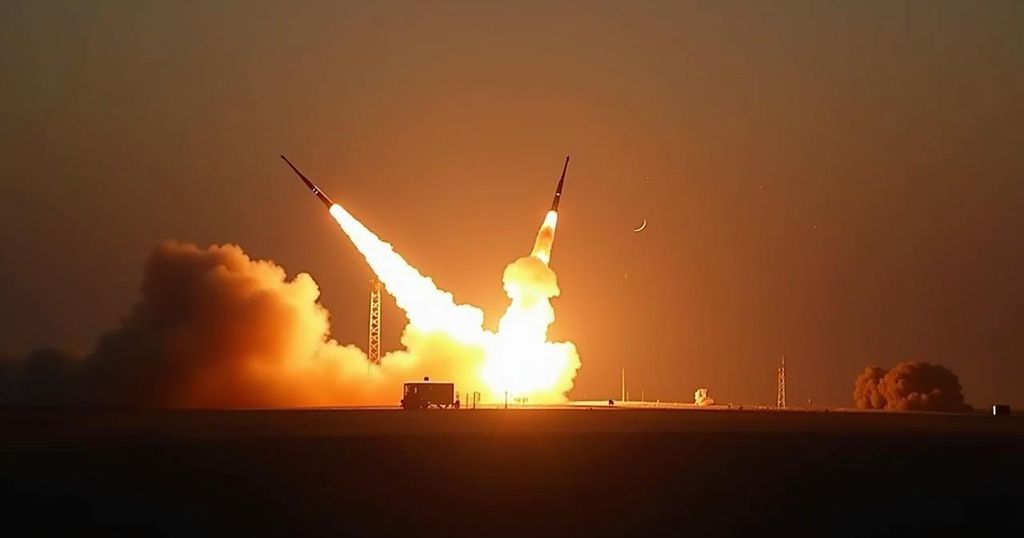Escalating Tensions: Iranian Missile Claims and Calls for International Intervention in the Middle East
Tensions in the Middle East escalate as the Israeli army claims missiles have been fired from Iran. Prime Minister Najib Mikati warns Lebanon faces a dangerous phase, while Danish Prime Minister Mette Frederiksen suggests international intervention may facilitate peace. The situation includes military casualties, a state of emergency declared in Israel, and an urgent call for a ceasefire from UN Secretary-General Antonio Guterres.
The situation in the Middle East has escalated sharply, with reports indicating that the Israeli army is asserting that missiles have been fired from Iran towards Israel. Prime Minister Najib Mikati of Lebanon has declared that the country is facing a perilous period in its history, coinciding with observed flares and missiles in the skies over Tel Aviv. As the Israeli military continues to monitor the situation, they have noted the likelihood of a wide-scale missile attack, accompanied by sirens sounding across the region. Despite these alarming developments, Iran has yet to confirm involvement in such hostilities. Mette Frederiksen, the Prime Minister of Denmark, has suggested that an international military intervention could be a pathway to reinstate a two-state solution and alleviate the enduring deadlock. She criticized the current response mechanisms to the conflict and reaffirmed the necessity of a decisive approach as the Israeli army reports a ground offensive against Hezbollah in southern Lebanon. Frederiksen stated, “There is no solution in sight to what we see going on over there, and there is no point in letting things continue,” emphasizing the need for urgent action. Recent military actions have led to casualties in Israel, with reports of at least ten individuals injured. The Israeli military has also confirmed the elimination of Hezbollah commander Muhammad Jaafar Qasir in Beirut, who was implicated in the arms transfer operations from Iran to Hezbollah. Israel has enacted a state of emergency as medical authorities grapple with the aftermath of these escalating tensions. As analysis of public sentiment in Israel reveals, citizens have been swept up in a wave of optimism regarding recent military achievements. However, this is now tempered by the declared state of emergency, with Professor Menachem Klein commenting on the potential impacts this change may have on public discourse concerning military actions against Iran’s nuclear initiatives, especially as the Jewish New Year approaches. Meanwhile, United Nations Secretary-General Antonio Guterres has voiced deep concern about the rising conflict in Lebanon and has called for an immediate ceasefire. He stressed the importance of adhering to Lebanon’s sovereignty and territorial integrity, demonstrating the international community’s apprehension regarding the possibility of widespread conflict in the region.
The ongoing conflict in the Middle East has generated significant international attention, particularly due to escalating tensions between Israel and Hezbollah, a militant group based in Lebanon. Iran’s involvement has further complicated the landscape, as Israel has accused Iran of supplying weapons to its adversaries, intensifying fears of a broader confrontation. Observations of missile activity and military operations signify a critical moment that could redefine regional dynamics. Leaders from various nations are advocating for a diplomatic solution, recognizing the dire consequences of prolonged conflict.
In summary, the current crisis in the Middle East is underscored by allegations of missile attacks from Iran towards Israel, leading to a heightened state of alert and emergency within Israel. The discourse surrounding these developments reflects a mix of military action and calls for diplomatic intervention from international leaders such as Denmark’s Mette Frederiksen and UN Secretary-General Antonio Guterres. As both military and civilian authorities grapple with the implications of these events, the overarching goal remains to avert a full-scale war and instate a stable resolution to the longstanding conflict.
Original Source: www.aljazeera.com




Post Comment